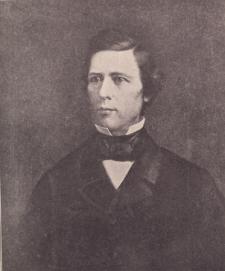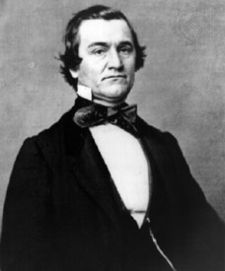Whereas, opinions have been expressed by eminent
members of the Democratic Party, and by a Convention of the party
in New York assembled, for the purpose of selecting delegates to
the Baltimore Convention, that the municipal laws of the Mexican
territories, would not be changed in the ceded territories, by
the cession to the United States, and that slavery could not be re-established
except by the authority of the U.S. or of the legislature of the
territorial government---that no doubts should be allowed to
exist upon a subject so important and at the same time so
excited. Be it further
Resolved, That the treaty of
cession should contain a clause securing an entry into those
territories to all the citizens of the United States, together
with their property of every description, and that the same
should remain protected by the U.S. while the territories are
under its authority.
Resolved, That if it should
be found inconvenient to insert such a clause into the treaty of
cession, that our Senators and Representatives in Congress should
be vigilant to obtain before the ratification of such a treaty,
ample securities that the rights of the Southern people should
not be endangered during the period the territories shall remain
under the control of the U.S. either from the continuance of the
municipal laws of Mexico, or from the legislation of the U.S.
Resolved, That the opinion
maintained and advanced by some, that the people of a territory,
acquired by the common toil, suffering, blood, and treasure of
the people of all the States, can, in other events than in the
forming [of] a Constitution prepatory to admittance as a State
into the Union, lawfully or constitutionally prevent any citizen
of any such states from removing to, or settling in such
territory with his property, be it slave property or otherwise,
is a restriction as indefensible in principle and as dangerous in
practice, as if such restriction were imposed by act of Congress.
Resolved, That the
Democratic party is and should be co-extensive with the Union:
and that while we disclaim all intention to interfere in the
local division and controversies in any of our sister States, we
deem it a solemn duty, which we owe to the constitution, to
ourselves, and to that party, to declare our unalterable
determination neither to recognize as Democrats or to hold
fellowship or communion with those who attempt to denationalize
the South and its institutions by restrictions by restrictions
upon its citizens and those institutions, calculated to array one
section, in feeling and sentiment, against the other, and that we
hold the same to be alike treason to party faith, and to the
perpetuity of the Union of these states.
Resolved, That this
Convention pledges itself to the country, and its members pledge
themselves to each other, under no political
necessity whatever, to support for the
offices of President and Vice President of the United States, any
person who shall not openly and avowedly be opposed to either of
the forms of excluding slavery from the territories of the U.S.
mentioned in the resolutions, as being alike in violation of the
constitution, and of the just and equal rights of the
slaveholding States.
Resolved, That these
resolutions be considered as instructions to our delegates to the
Baltimore Convention, to guide them in their votes in that body;
and that they vote for no men for President or Vice-President,
who will not unequivocally avow themselves to be opposed to
either of the forms of restricting slavery, which are described
in these resolutions.
Resolved, That as democrats
we are proud to find, that every statesman in the non
slaveholding States who has declared opinions favorable to the
constitutional equality os southern Citizens in acquired
territory, is of our own political brotherhood, and that every
public meeting or other body political or legislative, which has
taken sides for us, is, without exception, also democratic---and
we commend this fact to the whigs of the South as an important
element to be considered by them, when they are choosing friends,
allies, or candidates "without distinction of party."
[At this point the Platform shifted focus to a series
of resolutions about the Mexican War]
|

